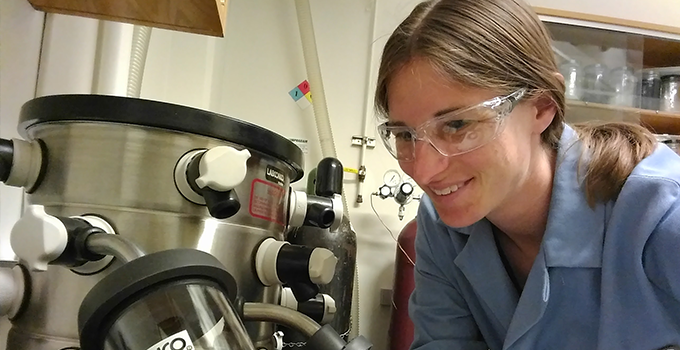Helping us deal with a post-antibiotic world

The development of antibiotics has been essential to the massive advancements we’ve seen in medicine and health over the last century. However, antibiotic-resistance is leading many to fear we are entering a ‘post-antibiotic’ world, potentially returning us to a time where the most basic illnesses could kill once again. Through her work on synthetic peptides, future RSC researcher Lara Malins is hoping to combat this problem.
Malins is a native of Hawaii, but moved to Australia in 2010 to complete her PhD at the University of Sydney. Her postgraduate studies in the group of Professor Richard Payne first sparked her interest in peptides. Prior to beginning her PhD, Malins worked in a research laboratory on small molecule synthesis, developing new ways to build molecular complexity from simple chemical precursors. However, she had never tackled molecules as large or as intricate as proteins.
“Coming in to the PhD, the idea of applying my skills to peptide and protein synthesis was really interesting and attractive to me.” Malins was particularly inspired by the prevalence of proteins in nature and in the human body: “They're responsible for all sorts of biological functions, and at the same time, numerous disorders are linked to abnormalities in protein expression or to the types of modifications that the proteins present. The idea that one could use chemical synthesis to probe questions on a biological scale was really exciting to me.” In pursuit of this goal, Malins completed her PhD studies in peptide and protein synthesis, exploring cancer vaccines and a number of bioactive peptides.
Malins continued her focus on peptide synthesis when she moved to The Scripps Research Institute in San Diego following her PhD, and hopes to further her studies when she comes to the ANU in October this year. After some settling in, Malins aims to build a strong team and apply her knowledge to tackle one of the globe’s biggest health issues.
“Antibiotic resistance is a huge problem globally,” Malins explains. “A couple of years back, the World Health Organisation sent out a call to action that essentially said, "we need everybody on board to develop new therapies, new means of detection, and new ways of helping people stay with the regime of prescribed antibiotic use."
Malins thinks peptides can help with this urgent need, particularly in the area of drug development. But that means first solving some fundamental issues.
“There are a lot of unresolved problems with peptide drugs,” Malins explains. “Your body has many naturally-occurring peptides, but they're often degraded very quickly.” The efficacy of peptides, as Malins describes, results from their ability to combine with very specific targets and modulate specific biological responses. As therapeutics, however, a lack of stability may mean that the peptide drug never makes it to its target site. Innovative chemistry may help slow the degradation of peptides in the body.
“Part of my goal is to use synthetic methods, organic chemistry mainly, to modify peptides—keeping their function and biological activity, but making them more stable. There are a number of strategies that one can pursue, including cyclization of the peptide, or modification of the residues of the peptide backbone. These changes may alter the molecule so that it becomes a more suitable therapeutic.”
Using these techniques, Malins hopes to develop new peptide-based antibiotics.
“Chemistry can really contribute to the development of new therapies. There are some promising peptide antibiotics, but they're currently very difficult to synthesise. While we can isolate them in small quantities, we can't modify them very easily because we're limited by what nature has produced. An alternative, however, is to develop a new, ‘ground up synthesis.’ By preparing a peptide from scratch in the laboratory, we can insert modifications, fine tune the biology, and also make the molecule more stable and more drug-like. That's one of my primary research aims when I arrive at the ANU—trying to tackle the issue of antimicrobial resistance through the design of new peptide antibiotics.”
In doing so, Malins will hopefully take her work in the lab to a global stage, helping us deal with an incoming post-antibiotic world that could be a health disaster.
